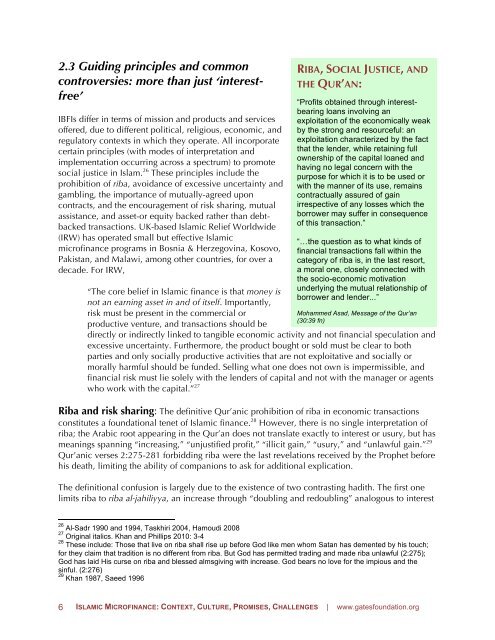ISLAMIC (MICRO)FINANCE
TrYIw
TrYIw
You also want an ePaper? Increase the reach of your titles
YUMPU automatically turns print PDFs into web optimized ePapers that Google loves.
2.3 Guiding principles and common<br />
controversies: more than just ‘interestfree’<br />
IBFIs differ in terms of mission and products and services<br />
offered, due to different political, religious, economic, and<br />
regulatory contexts in which they operate. All incorporate<br />
certain principles (with modes of interpretation and<br />
implementation occurring across a spectrum) to promote<br />
social justice in Islam. 26 These principles include the<br />
prohibition of riba, avoidance of excessive uncertainty and<br />
gambling, the importance of mutually-agreed upon<br />
contracts, and the encouragement of risk sharing, mutual<br />
assistance, and asset-or equity backed rather than debtbacked<br />
transactions. UK-based Islamic Relief Worldwide<br />
(IRW) has operated small but effective Islamic<br />
microfinance programs in Bosnia & Herzegovina, Kosovo,<br />
Pakistan, and Malawi, among other countries, for over a<br />
decade. For IRW,<br />
“The core belief in Islamic finance is that money is<br />
not an earning asset in and of itself. Importantly,<br />
risk must be present in the commercial or<br />
productive venture, and transactions should be<br />
RIBA, SOCIAL JUSTICE, AND<br />
THE QUR’AN:<br />
“Profits obtained through interestbearing<br />
loans involving an<br />
exploitation of the economically weak<br />
by the strong and resourceful: an<br />
exploitation characterized by the fact<br />
that the lender, while retaining full<br />
ownership of the capital loaned and<br />
having no legal concern with the<br />
purpose for which it is to be used or<br />
with the manner of its use, remains<br />
contractually assured of gain<br />
irrespective of any losses which the<br />
borrower may suffer in consequence<br />
of this transaction.”<br />
“…the question as to what kinds of<br />
financial transactions fall within the<br />
category of riba is, in the last resort,<br />
a moral one, closely connected with<br />
the socio-economic motivation<br />
underlying the mutual relationship of<br />
borrower and lender...”<br />
Mohammed Asad, Message of the Qur’an<br />
(30:39 fn)<br />
directly or indirectly linked to tangible economic activity and not financial speculation and<br />
excessive uncertainty. Furthermore, the product bought or sold must be clear to both<br />
parties and only socially productive activities that are not exploitative and socially or<br />
morally harmful should be funded. Selling what one does not own is impermissible, and<br />
financial risk must lie solely with the lenders of capital and not with the manager or agents<br />
who work with the capital.” 27<br />
Riba and risk sharing: The definitive Qur’anic prohibition of riba in economic transactions<br />
constitutes a foundational tenet of Islamic finance. 28 However, there is no single interpretation of<br />
riba; the Arabic root appearing in the Qur’an does not translate exactly to interest or usury, but has<br />
meanings spanning “increasing,” “unjustified profit,” “illicit gain,” “usury,” and “unlawful gain.” 29<br />
Qur’anic verses 2:275-281 forbidding riba were the last revelations received by the Prophet before<br />
his death, limiting the ability of companions to ask for additional explication.<br />
The definitional confusion is largely due to the existence of two contrasting hadith. The first one<br />
limits riba to riba al-jahiliyya, an increase through “doubling and redoubling” analogous to interest<br />
26 Al-Sadr 1990 and 1994, Taskhiri 2004, Hamoudi 2008<br />
27 Original italics. Khan and Phillips 2010: 3-4<br />
28 These include: Those that live on riba shall rise up before God like men whom Satan has demented by his touch;<br />
for they claim that tradition is no different from riba. But God has permitted trading and made riba unlawful (2:275);<br />
God has laid His curse on riba and blessed almsgiving with increase. God bears no love for the impious and the<br />
sinful. (2:276)<br />
29 Khan 1987, Saeed 1996<br />
6<br />
<strong>ISLAMIC</strong> <strong>MICRO</strong><strong>FINANCE</strong>: CONTEXT, CULTURE, PROMISES, CHALLENGES | www.gatesfoundation.org


